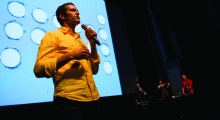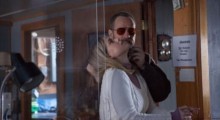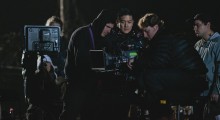Tze Chun
-
Still on the Job: Filmmakers on Their Second Jobs

Here’s the funny thing about an article on second jobs in filmmaking: It’s always relevant. The last piece I wrote for Filmmaker on this topic is still referenced: people continue to call me up to talk about it, and nearly as often as they did when it first appeared. But it’s been five years since I wrote it. So, as part of our ongoing look at the financial lives of artists, we thought it would be a good idea to revisit some of the filmmakers we interviewed in 2009 and see how their relationships with their second jobs have evolved […]
by Esther B. Robinson on Jul 17, 2014 -
Blood Money: Tze Chun on Cold Comes the Night

The sophomore effort from Tze Chun (Children of Invention), thriller Cold Comes the Night, uses invigorated noir conventions to evoke the betrayed modern social compact in a dreary, post-industrial strip of upstate New York. Chloe (Alice Eve), a poor widow and single mother, manages a fleabag motel, the type that charges prostitutes and johns by the hour. Social Services is on Chloe’s case for providing such a rotten environment for her eight-year-old daughter Sophia (Ursula Parker), giving her two weeks to straighten out their circumstances before they intervene. Then things get worse — a Slavic drug runner named Topo (Breaking Bad‘s Bryan […]
by Brandon Harris on Jan 11, 2014 -
Hawaii International Film Festival 2013

Bryan Cranston as a Polish gangster; Chuuk immigrants in Guam; a Japanese superhero dressed only in women’s panties; Honolulu transit controversies; a home run-hitting gorilla; and filmmaking initiatives from the Cook Islands — all these and more were on display during last month’s Hawaii International Film Festival. New films by Jia Zhang-ke, Hirokazu Kore-eda, Hayao Miyazaki, Brillante Mendoza and Dante Lam dominated the festival’s solid Asian lineup, while emerging talents such as Tze Chun and Steven J. Kung led its selection of American work. Casting its nets far closer to shore, the festival also highlighted local Hawaiian and Pacific Islander […]
by Jason Sanders on Jan 9, 2014 -
Too Much of a Good Thing?

Digital cinema has afforded independent filmmakers many benefits, one of which is the ability to achieve something previously only the province of big-budget films: very high shooting ratios. However, the resulting mass of footage can overrun the typical understaffed, underfunded, low-budget edit room. “You’re shooting more footage, and usually with two cameras,” says Paul Frank, editor of the recent Maggie Carey comedy The To Do List. While he notes that there are many pros to this way of shooting — it benefits performance, it allows for more improvisation and, ultimately, more options in the edit room — he also notes […]
by Shaun Seneviratne on Oct 21, 2013 -
Trailer Watch: Bryan Cranston and Alice Eve in Tze Chun’s Cold Comes the Night

Tze Chun, a 2007 25 New Face based on his great short, Windowbreaker, appears to have done a 180 follow-up to his first feature, the low-key, character-based drama Children of Invention. Cold Comes the Night stars Breaking Bad‘s Bryan Cranston, rising star Alice Eve and a missing bag of cash. But, note that I wrote “appears” in the above sentence. Last year, Kishori Rajan spoke to Chun about this movie while it was in production, and the director says it’s not entirely unlike his previous work: When his manager sent him as a writing sample a psychological thriller script by […]
by Scott Macaulay on Jul 24, 2013 -
Second-Time Director: Tze Chun and Cold Comes the Night

At Filmmaker we continuously cover the struggles of first-time directors to make their debut pictures. But the second film comes with its own set of unique challenges, issues that will be explored in this five-part series by Kishori Rajan. Below is the first installment, chronicling Filmmaker 25 New Face Tze Chun’s move from the microbudget character drama Children of Invention to a thriller with stars like Bryan Cranston. Look for further articles in the weeks ahead. — SM The late producer Laura Ziskin once remarked that movies “aren’t made, but forced into existence,” an expression never more apt than when […]
by Kishori Rajan on Dec 10, 2012 -
“CHILDREN OF INVENTION” writer-director, Tze Chun
[PREMIERE SCREENING: Sunday, Jan. 18, 2:30 pm — Prospector Square Theatre, Park City] When I was younger, my uncle told me about growing up in China during World War II, and, after a carpetbombing, seeing people emerge from a theater destroyed only seconds before. People were missing limbs, they were bleeding, searching for their friends or relatives or dates. I found it fascinating that people still went to the movies when there was the possibility that you might get blown up. Though I guess at that time you could probably have gotten blown up anywhere, so why not get blown […]
by Jason Guerrasio on Jan 18, 2009
